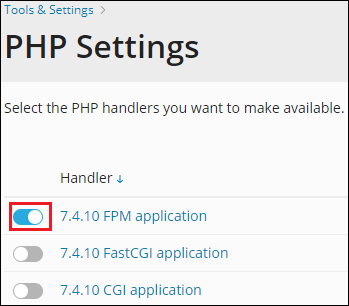Question
How to enable/disable PHP handlers in Plesk?
Answer
- Log into Plesk.
- Go to Tools & Settings > PHP Settings.
-
To enable: move the slider to the right in front of the required PHP handler:

To disable: move the slider to the left in front of the required PHP handler:
Note: in the case, the required PHP handler is missed, install it using the steps from this article.
Solution using the SSH access
- Log into the server via SSH.
- Execute the command below to list all installed PHP handlers:
# plesk bin php_handler --list
The result will be as on the screenshot below:
Click on the screenshot below to expand

-
To enable: using the id of the required PHP handler from the step №2 execute the command below:
# plesk bin php_handler --enable -id plesk-php73-cgi
To disable: using the id of the required PHP handler from the step №2 run the following command:
# plesk bin php_handler --disable -id plesk-php73-cgi
Note: in the case, the required PHP handler is missed, install it using the steps from this article.
Solution using the RDP access
- Log into the server via RDP.
- Start a command prompt as an Administrator.
- Execute the command below to list all installed PHP handlers:
C:> plesk bin php_handler --list
The result will be as on the screenshot below:
Click on the screenshot below to expand
-
To enable: using the id of the required PHP handler from the step №3 execute the command below:
C:> plesk bin php_handler --enable -id fastcgi-7.0
To disable: using the id of the required PHP handler from the step №3 run the following command:
C:> plesk bin php_handler --disable -id fastcgi-7.0
Note: in the case, the required PHP handler is missed, install it using the steps from this article.
